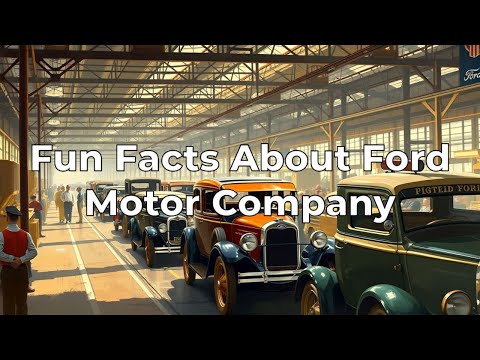
Facts About Ford: Discover the Legacy of Ford Motor Company

When we talk about the automotive industry, certain names inevitably surface, and Ford Motor Company is undeniably at the top of that list. Established in 1903, Ford has been a key player in shaping the automotive landscape, cultivating a legacy that resonates through its innovative spirit and relentless pursuit of progress. It is one of the most crucial companies in terms of industry transformation, producing vehicles that have catered to various generations of Americans. This article explores the significant facts about Ford, delving deep into the elements of its history, achievements, and enduring influence.
Ford Motor Company is not just a manufacturer of cars and trucks; it represents a vital part of America's industrial story. Throughout its more than a century-long existence, the company has made strides that have revolutionized not just transportation, but the broader American economy and society. From the introduction of the Model T to modern-day investments in electrification, the company remains at the forefront of innovation. Join us as we uncover fascinating Ford facts that highlight this remarkable company’s journey and its ongoing legacy.
The Founding of Ford Motor Company
Ford Motor Company was founded in June of 1903 by Henry Ford and 11 investors who believed in the potential for a changing automotive landscape. The company's early days were marked by modest production and innovative ideas. The initial headquarters were located in a converted wagon shop in Dearborn, Michigan, where Ford began to shape his vision. As the firm matured, it laid important foundations for the modern automotive industry.
Henry Ford’s vision was not merely to produce automobiles but to make them accessible to the general public. His insistence on a combination of affordable pricing and efficient production methods would define the future of automotive manufacturing. By 1908, Ford introduced the Model T, a car that would transform not only the company but the entire automotive industry.
Innovations that Changed the Automotive Industry
One of the most significant innovations Ford introduced was the moving assembly line. This groundbreaking concept revolutionized production processes across numerous industries, not just automotive. Implemented in 1913, the assembly line allowed factories to produce vehicles at unprecedented speeds and efficiency. By streamlining the production workflow, Ford was able to reduce the time it took to build a car from over 12 hours to just 90 minutes.
This innovation not only led to lower production costs but also made it possible to price cars more affordably, opening the doors to vehicle ownership for millions across America. The economic implications of this innovation were vast, leading to the rise of a new middle class that was able to afford personal automobiles.
The Impact of the Model T
The Model T is often regarded as one of the most pivotal automobiles in history. Released in 1908, this vehicle was designed to be practical, reliable, and economical. Ford's vision was to create a car that could be driven by anyone, and the Model T achieved that goal. By keeping production costs low, the Model T was priced around $850, then lowered further to about $300 by 1925.
Due to its affordability and functionality, the Model T quickly became popular among American families. By 1927, over 15 million units were sold, making it the bestselling car of its time. The Model T not only democratized car ownership but also influenced American culture, enabling countless people to travel long distances and contributing to the layout of the modern American landscape.
Ford's Role in American Society and Economy
Ford's contributions to American society go beyond just manufacturing cars. The company fundamentally altered the economic landscape by creating jobs and stimulating the economy. The establishment of mass production techniques resulted in the need for vast numbers of workers, significantly boosting employment in the early 20th century. Ford’s factories employed thousands of workers and, in 1914, he famously introduced the $5 workday, which was a substantial wage at that time.
This strategy not only reduced worker turnover but also led to increased purchasing power among employees. Many of them could now afford to buy cars, further boosting demand for Ford products. The phenomenon created a self-reinforcing cycle where jobs led to higher wages, which in turn fueled consumption and economic growth.
Like any great company, Ford has faced its fair share of challenges throughout its history. The company has navigated significant crises, including the Great Depression, increasing competition from foreign automakers, and the oil crises of the 1970s. Each challenge pushed Ford to adapt and innovate, ensuring its survival and continued relevance in a changing marketplace.
For example, during the Great Depression, Ford's production slowed significantly, and the company faced financial pressure. However, through strategic decisions—including the introduction of lower-cost models—Ford was able to stabilize and eventually thrive in a challenging economic environment.
Strategic Shifts Towards Sustainability
In recent years, Ford has made pivotal strategic shifts focusing on sustainability and environmentally friendly production methods. Acknowledging the growing concerns about climate change and sustainability, Ford is committed to implementing more eco-friendly practices in its production lines and vehicle designs. The company aims not only to improve its manufacturing processes but also to develop vehicles that meet the needs of a more environmentally conscious consumer base.
Ford's initiatives include sourcing sustainable materials, reducing waste, and improving energy efficiency within production facilities. Furthermore, the company emphasizes recycling and reusing materials to minimize its carbon footprint, an essential commitment for modern corporations.
Investment in Electrification and Future Goals
In alignment with global shifts toward electrification, Ford has invested over $50 billion in developing electric vehicles and related technology. This commitment is marked by the launch of several all-electric models, including the highly anticipated Ford Mustang Mach-E and the electric version of the Ford F-150, known as the F-150 Lightning.
Ford aims to become a leader in the electric vehicle market, targeting a significant portion of its lineup to be electric or hybrid by 2030. The automotive giant is also working on technological advancements that enhance battery capacity and efficiency, ensuring that their electric vehicles are competitive in terms of range and performance.
Conclusion: The Ongoing Legacy of Ford
As we reflect on the rich history and hopeful future of Ford Motor Company, it is evident that their journey is one of innovation, resilience, and adaptation. The facts about Ford illustrate a company that not only shaped the automotive industry but also played a critical role in the cultural and economic development of the United States.
Today, Ford continues to embrace the challenges of the modern era, focusing on sustainability and technology to drive future growth. With ongoing investments in electric vehicles and a commitment to achieving a zero carbon footprint by 2050, Ford's legacy as a pioneer in the automotive industry is far from over. As they move toward a greener future, the ongoing Ford facts remind us of the importance of innovation, as this iconic brand continues to lead the way in automotive excellence.
Did you find this article helpful? Facts About Ford: Discover the Legacy of Ford Motor Company See more here General.
Leave a Reply





Related posts